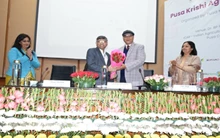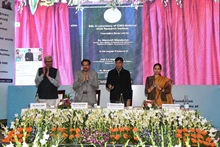
The presence of heavy metals in the food chain endangers both food safety and human health. The findings have been published in Toxicology Reports, a globally renowned journal. Prince Kumar Singh, Jay Shankar Yadav, Indrajeet Kumar, and Umesh Kumar conducted the study in Bhadohi's suburbs from March 2019 to February 2020 under the supervision of Botany assistant professor Rajesh Kumar Sharma.
According to Sharma, the use of wastewater in agriculture has both positive and negative implications. Wastewater contains many harmful toxic metals, microorganisms, and emerging contaminants, but it is also a rich source of nutrients and organic matter. The presence of heavy metals in ecosystems above prescribed limits is harmful to flora, fauna, and human health, and it is the primary cause of metallic pollution of irrigation water, soil, and major crops such as cereals and vegetables grown in developing city suburbs.
In this study, 84 composite samples of vegetables (palak, radish, garlic, cabbage, and brinjal) and cereals (paddy, wheat) were collected on a seasonal basis, according to him. All of the samples were washed with running tap water, cut into small pieces, and baked to dry. The dried samples were then ground into powder and heated for 6-8 hours at a constant temperature with di-acid (nitric acid and perchloric acid). The Atomic Energy Commission examined the levels of heavy metal contamination (cadmium, nickel, chromium, copper, and zinc) in vegetable and grain filtrates.
According to him, the highest and lowest concentrations of copper were found in wheat grains (279 mg/kg) and garlic (71 mg/kg), respectively. Wheat contained the most nickel and chromium (42.3 mg/kg and 17.1 mg/kg, respectively), while brinjal and garlic contained the least (10.3 mg/kg and 2.9 mg/kg, respectively).
Palak had the highest zinc and cadmium concentrations (58.4 mg/kg and 5.3 mg/kg, respectively) and garlic had the lowest (27.6 mg/kg and 19 mg/kg, respectively). Copper and chromium levels were found to be below the Indian Standard safety limit in all vegetables and grains. Among the tested vegetables and grains, only palak exceeded the safe limit for zinc. Nickel and cadmium levels in all tested vegetables and grains exceeded both Indian and WHO/FAQ safety limits. Nickel concentrations in groundwater-irrigated vegetables and grains were also found to be above Indian safety limits.
According to Sharma, the maximum daily intake of heavy metals by local residents was recorded for nickel via wheat grains and chromium via radish and garlic. Copper, nickel, and cadmium health indexes were greater than one unit for children and adults who consumed wheat and paddy grains. If such contaminated food items are consumed for an extended period of time, these heavy metals can pose serious health risks to the locals. As a result, proper monitoring and management of these metals are required.
He went on to say that chronic consumption of heavy metal-contaminated vegetables and other food items can lead to a variety of diseases, including mental and behavioral disorders, asthma, cancer, nervous system-related diseases, cardiovascular diseases (heart-related), kidney or renal-related diseases, endocrine system irregularities, particularly in pregnant women (mother and child), obesity, and breast cancer. Excessive sewerage can be attributed to insufficient sanitation facilities, poor septage management, and a lack of sewage and sanitation policies.
He claims that industrial waste and unsustainable agricultural practices are contaminating groundwater on a large scale. In developing countries, building infrastructure to collect and treat wastewater necessitates additional financial resources. This is especially true for advanced treatment technologies, which can be costly, though solutions include using groundwater instead of wastewater for irrigation, avoiding mono-cropping, and employing a variety of scientific methods.









